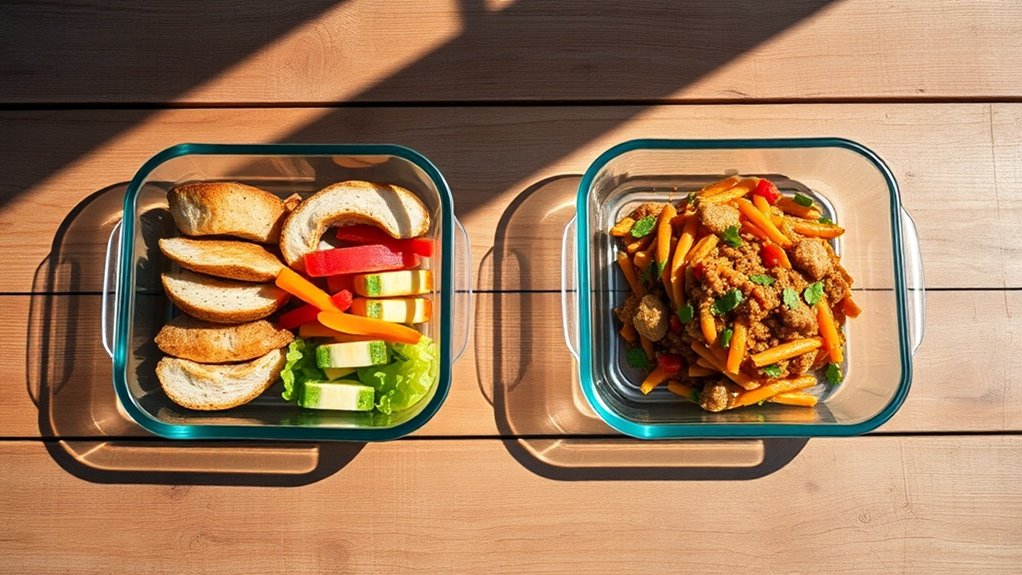How I Finally Stopped Emotional Eating Without Feeling Deprived
You’ve probably found yourself reaching for snacks during stressful moments, but it doesn’t have to be this way. Understanding your emotional eating triggers is the first step toward making lasting changes. By exploring mindful eating practices and incorporating healthier alternatives, you can create a more balanced relationship with food. It’s also crucial to build a supportive environment. But how do you start this transformative journey without feeling deprived?
Key Takeaways
- Identified emotional triggers through journaling, allowing for better understanding of cravings and healthier coping strategies.
- Practiced mindful eating by slowing down and savoring each bite, enhancing connection to food and body signals.
- Replaced high-calorie snacks with nutritious alternatives like fresh fruit and Greek yogurt, satisfying cravings without deprivation.
- Built a supportive environment by removing temptations and engaging friends in health goals, fostering accountability and encouragement.
- Cultivated self-compassion and patience, recognizing setbacks as part of the journey and celebrating small victories along the way.
Understanding Emotional Eating Triggers
What causes you to reach for that snack when you’re feeling down?
Emotional triggers, like stress or loneliness, often lead you to seek comfort in food. When you’re feeling overwhelmed, your brain releases cortisol, which can increase cravings for sugary, high-calorie treats. Elevated cortisol levels can also hinder fat burning, making it even harder to manage weight effectively.
Recognizing these triggers is crucial to stop emotional eating naturally. You might find that journaling or identifying feelings can help you understand the root cause of your cravings.
Instead of reaching for snacks, consider healthier outlets like exercise or talking to a friend. Acknowledging your emotions empowers you to break the cycle and make more mindful choices.
Mindful Eating Practices
Recognizing your emotional triggers lays the groundwork for adopting mindful eating practices.
Start by slowing down during meals; chew thoroughly and savor each bite.
This helps you connect with your food and body’s signals.
Pay attention to hunger and satiety cues—eat when you’re hungry, and stop when you’re satisfied, not stuffed.
Eliminate distractions like screens, allowing you to focus solely on your meal.
Consider keeping a food diary to reflect on your choices and feelings, fostering awareness.
Incorporating mindful eating techniques can further enhance your experience and promote a healthier relationship with food.
Building a Supportive Environment
How can you create an environment that supports your journey toward healthier eating habits?
Start by surrounding yourself with positive influences.
Remove tempting snacks from your home and stock up on fresh fruits and vegetables.
Engage family and friends in your goals—share your intentions and seek their support.
Establish a routine that incorporates meal planning and cooking, making it easier to choose healthy options.
Also, create a designated eating space, free from distractions, to practice mindful eating. Additionally, remember that building a support system can significantly enhance your commitment to healthier choices.
Incorporating Healthy Alternatives
Have you ever wondered how simple swaps in your diet can help curb emotional eating?
By replacing high-calorie snacks with healthier options, you can satisfy cravings without the guilt.
For instance, try air-popped popcorn instead of chips or fresh fruit instead of sugary desserts.
Incorporating vegetables into your meals adds fiber and nutrients, promoting satiety.
Greek yogurt can serve as a protein-rich alternative to ice cream.
Research shows that mindful eating and choosing nutritious alternatives can reduce emotional triggers. Additionally, managing caloric intake is essential for effective fat loss and can further support your journey towards healthier eating habits.
Cultivating Self-Compassion and Patience
Making healthier food choices can be a significant step in managing emotional eating, but it’s equally important to develop a compassionate mindset toward yourself during this journey.
Recognize that change takes time, and setbacks are normal.
Instead of criticizing yourself for indulgences, practice self-compassion by acknowledging your feelings and understanding your triggers.
Research shows that self-kindness can lead to better emotional regulation and healthier habits. A positive mindset is essential for sustainable weight management.
Be patient with yourself; progress isn’t linear.
Celebrate small victories and learn from challenges.
Embracing this mindset fosters resilience, making it easier to navigate your relationship with food and emotions without guilt or shame.





